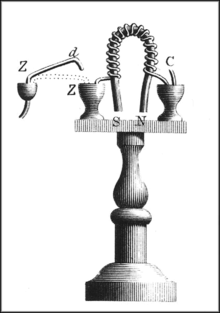William Sturgeon
William Sturgeon (22 May 1783 – 4 December 1850) was an English physicist and inventor who made the first electromagnets, and invented the first practical English electric motor.
| William Sturgeon | |
|---|---|
|
William Sturgeon | |
| Born |
22 May 1783 Whittington, Lancashire |
| Died |
4 December 1850 (aged 67) Prestwich, Lancashire |
| Nationality | English |
| Fields | physics |
| Institutions | electromagnets |
| Known for | electromagnet and electro motor |
| Influences | Charles Grafton Page |
| Influenced | Charles Grafton Page |

Early life
Sturgeon was born in Whittington, near Carnforth, Lancashire, and apprenticed to a shoemaker. He joined the army in 1802 and taught himself mathematics and physics. In 1824 he became Lecturer in Science and Philosophy at the East India Company's Military Seminary at Addiscombe, Surrey, and in the following year he exhibited his first electromagnet.[2] He displayed its power by lifting nine pounds with a seven-ounce piece of iron wrapped with wire through which a current from a single battery was sent.
In 1832 he was appointed to the lecturing staff of the Adelaide Gallery of Practical Science in London, where he first demonstrated the DC electric motor incorporating a commutator.
Annals of Electricity
In 1836 Sturgeon established the journal Annals of Electricity, Magnetism and Chemistry, and in the same year he invented a galvanometer.[2]
Sturgeon was a close associate of John Peter Gassiot and Charles Vincent Walker and the three were instrumental in founding the London Electrical Society in 1837.[3]
In 1840 he became superintendent of the Royal Victoria Gallery of Practical Science in Manchester. He formed a close social circle with John Davies, one of the Gallery's promoters, and Davies' student James Prescott Joule, a circle that eventually extended to include Edward William Binney and John Leigh.[4] The Gallery closed in 1842, and he earned a living by lecturing and demonstrating. He died in Prestwich in 1850[2] and is buried in the Churchyard of St Mary's Parish Church in a tomb that calls him "William Sturgeon ~ The Electrician".
References
- ↑ Thompson, Sylvanus P. (1891): Lectures on the Electromagnet. W.J. Johnson Co., New York, p.17-19
- ↑ 2.0 2.1 2.2 Gee (2004)
- ↑ Harrison, W. J. (2004) "Gassiot, John Peter (1797–1877)", rev. Iwan Rhys Morus, Oxford Dictionary of National Biography, Oxford University Press, accessed 5 Aug 2007 (subscription required)
- ↑ Kargon (1977) pp38-40
Bibliography
- Gee, W. (2004) "Sturgeon, William (1783–1850)", rev. Frank A. J. L. James, Oxford Dictionary of National Biography, Oxford University Press, accessed 25 July 2007 (subscription or UK public library membership required)
- Kargon, R. H. (1977). Science in Victorian Manchester: Enterprise and Expertise. Baltimore: Johns Hopkins University Press. ISBN 0-8018-1969-5.
- Vibart, H. M. (1894). Addiscombe: its heroes and men of note. Westminster: Archibald Constable. pp. 77–80.
See also
| Wikiquote has quotations related to: William Sturgeon |
|
